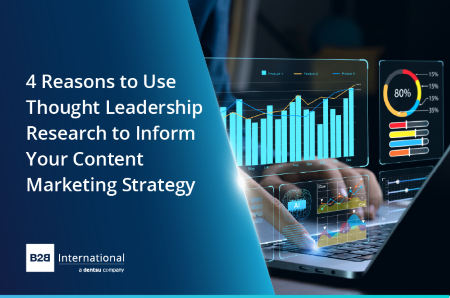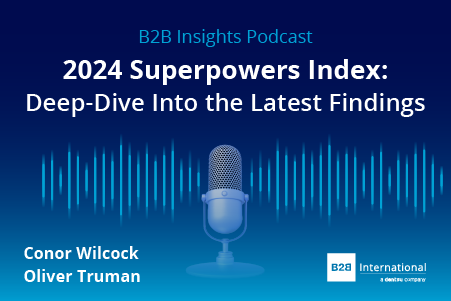
The competitive environment is more intense than ever before. The number of brands considered in a B2B buying journey has increased 62% since 2021 (Source: The 2024 Superpowers Index).
With increased competition, decision makers are turning to thought leadership content to help guide their strategic business decisions.
Given the vast amount of thought leadership content already available, it is important that businesses consider how to capture their audience’s attention and keep them engaged. This is particularly challenging in 2024 as people are exposed to hundreds of pieces of content every day across the channels they spend time.
Insights-driven thought leadership content provides a great opportunity to engage with your target audience in a thoughtful and relevant way, and helps to differentiate your brand from competitors, especially in markets where buyers see little difference between solutions provided.
The 2024 Superpowers Index highlighted the ever-increasing importance of thought leadership, with the ability of brands to display ‘active thought leadership in a sector’ rising to third place (from 20th in the 2023 study) in factors influencing their buying decisions.
Despite this, only 25% of buyers currently rate B2B brands highly on thought leadership, presenting a significant opportunity for brands to establish authority and strengthen their market position.
How Thought Leadership Research Can Inform and Elevate Your Content Marketing Strategy
Effective thought leadership research can be used to:
- Enhance a brands credibility
- Offer a unique perspective
- Increase engagement
- And position a brand as a knowledge leader
Build trust and credibility
B2B decision makers use thought leadership as a means for assessing a company’s competencies and capabilities. The primary objective of thought leadership is to educate rather than sell.
To be considered a thought leader, a company must be a trusted and credible source, capable of navigating its customers and prospects through today’s ever-changing business landscape.
By conducting independent research and sharing evidence-based insights in their marketing content, companies will establish themselves as trusted advisors and boost their credibility.
Offer a unique POV
Many pieces of thought leadership found across the internet recycle the same publicly available statistics and restate what’s already been said, but fresh opinions and new insights prove a unique advantage over competitors. The latest insights and trends are particularly relevant to c-suite audiences responsible for setting the direction of the company and making strategic decisions.
Conducting original, independent research allows a business to claim the white space around their findings, delivering innovative (and sometimes controversial) ideas and providing a unique perspective. A company can also use its proprietary findings to interpret and respond to industry developments by comparing current attitudes and trends to previous research they have completed.
Engage your target audience
When writing thought leadership, it is crucial to consider how the topics will resonate with your target audience. Conducting independent thought leadership research allows a business to gain deep insights into their audience’s needs, opinions, and desires.
These insights guide the selection of themes and concepts to include in marketing activities, ensuring content addresses current trends and customer pain points. Customers and prospects are much more likely to engage and resonate with content that addresses their challenges and inspires their day-to-day work.
Showcase category and industry expertise
Using primary research in thought leadership content helps businesses to demonstrate a much deeper understanding of a category or industry. Regularly surveying decision-makers, industry experts, and business leaders allows a company to stay on the pulse of emerging trends and keep up to date with industry best practices.
By tailoring its content and solutions to the challenges their audience are facing and any new opportunities their customers should be looking at, companies can establish themselves as a true industry and category thought leader and a key information resource at every point of a buyer’s journey.
Once a brand can establish itself as an industry expert, audiences will be much more likely to seek out and have a preference for content published by the brand in the future. The key to thought leadership is that the content must be valuable and actionable – extending outside of only opinion pieces or self-centered marketing messages.
Alongside ensuring the content is relevant, it also needs to be interesting – whether delivered as a blog, newsletter or dedicated report. The B2B International team can use our experience to identify and test topics, including uncovering audience needs, consumption habits and emerging trends, whether as a standalone project or through the inclusion of ‘guest questions’ included within a wider research study.
To discuss how our tailored insights programs can help solve your specific business challenges, get in touch and one of the team will be happy to help.


